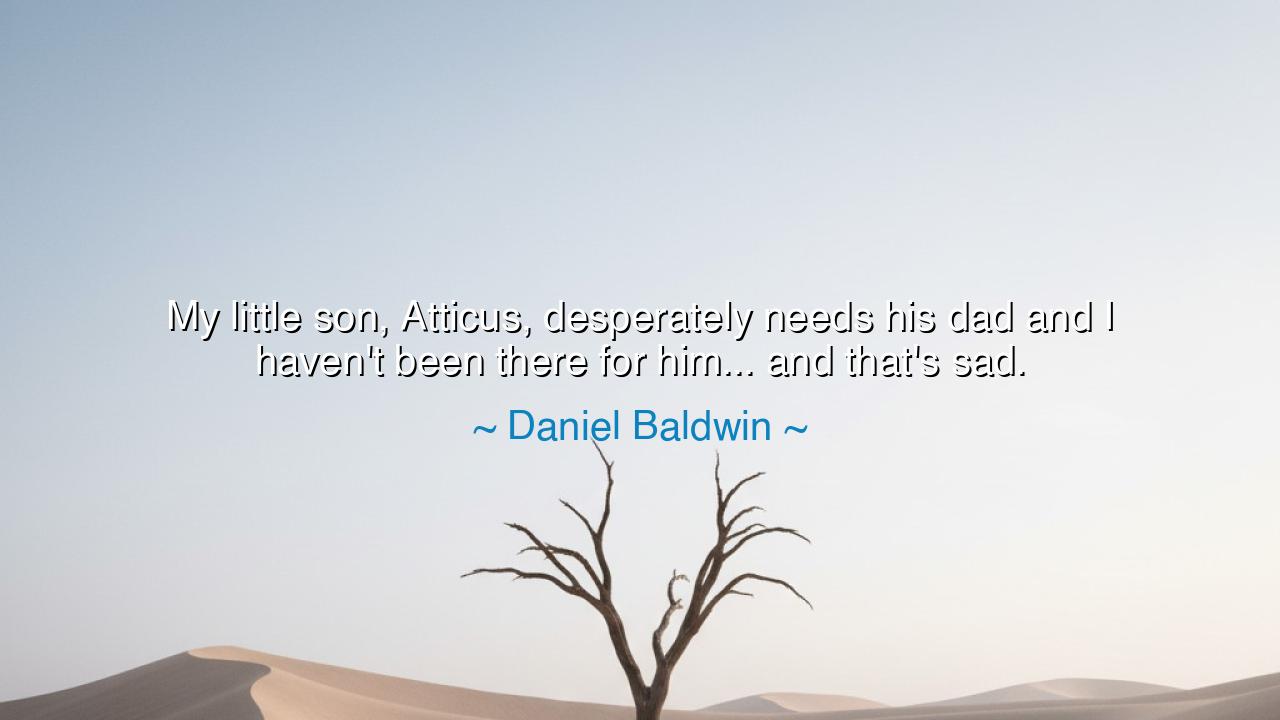
My little son, Atticus, desperately needs his dad and I haven't
My little son, Atticus, desperately needs his dad and I haven't been there for him... and that's sad.






There are sorrows that cut deepest not in the public eye, but in the quiet chambers of the heart, where duty and love are inseparable. Daniel Baldwin, reflecting on his relationship with his young son, said, “My little son, Atticus, desperately needs his dad and I haven't been there for him... and that's sad.” In these words lies the profound recognition of the obligations of parenthood, and the human pain that arises when one perceives a failure to fulfill them. Baldwin’s lament is both personal and universal: it speaks to the timeless grief of absence, the ache of knowing a child longs for what one has yet to provide.
The sadness he expresses is rooted in the awareness of unmet need. Ancient philosophers understood that human flourishing depends upon nurturing relationships, particularly between parent and child. Aristotle wrote of the moral and social importance of familial bonds, teaching that the well-being of the young shapes the moral character of the family and, by extension, the polis. Baldwin’s regret mirrors this ancient truth: when the child’s needs go unmet, both parent and child feel the weight of that absence.
To acknowledge one’s absence is itself an act of reflection and conscience. Baldwin’s recognition that he “hasn’t been there” demonstrates the first step toward repair: awareness. In antiquity, Stoic philosophers emphasized that recognition of duty is the beginning of virtue. Marcus Aurelius reminds us that the human mind must confront its failings with honesty if one wishes to cultivate wisdom and moral rectitude. Baldwin’s words embody this principle: sorrow arises not merely from circumstance, but from moral self-awareness.
History offers poignant parallels. Consider Alexander Hamilton, who lost his father in early childhood and whose own absences and preoccupations sometimes kept him distant from his family. Hamilton’s letters reveal the tension between duty and absence, and the enduring regret that can shadow a parent who struggles to balance life’s demands with the intimate needs of a child. Baldwin’s experience resonates with this timeless dilemma: the demands of life can impede presence, but the heart remains aware of the consequences.
There is also a lesson in the power of recognition to inspire change. Baldwin’s acknowledgment of his son’s need, even amidst sorrow, is a necessary prelude to action. Ancient wisdom teaches that grief, when coupled with intention, can become transformative. Confucius emphasized that parental duty is not only moral but active: one must endeavor to correct absence and cultivate presence. To recognize the sadness of one’s shortcomings is to plant the seed for reconciliation and growth.
This reflection also highlights the universality of parental longing. Every generation confronts the tension between responsibility and circumstance, between ambition and devotion. To feel sadness at one’s absence is to feel the weight of love itself—the recognition that a child’s development and emotional security are profoundly influenced by the presence or absence of a parent. Baldwin’s words remind us that this pain is not shame alone, but evidence of love and conscience.
From this reflection emerges a timeless lesson: be present, intentional, and compassionate in the lives of those who depend upon you. Awareness of absence is only the first step; meaningful engagement, attentive care, and sustained presence are the remedies. One must act to repair what is broken, nurture what is vulnerable, and ensure that love is not merely acknowledged, but lived.
Thus, let Daniel Baldwin’s confession guide us: confront your failings with honesty, recognize the needs of those entrusted to your care, and take deliberate steps to be present. In doing so, sorrow transforms into action, absence into presence, and regret into the opportunity for restoration. To honor the needs of a child is to fulfill the highest duty of parenthood and to invest in the moral and emotional legacy that endures beyond the fleeting passage of time.






AAdministratorAdministrator
Welcome, honored guests. Please leave a comment, we will respond soon